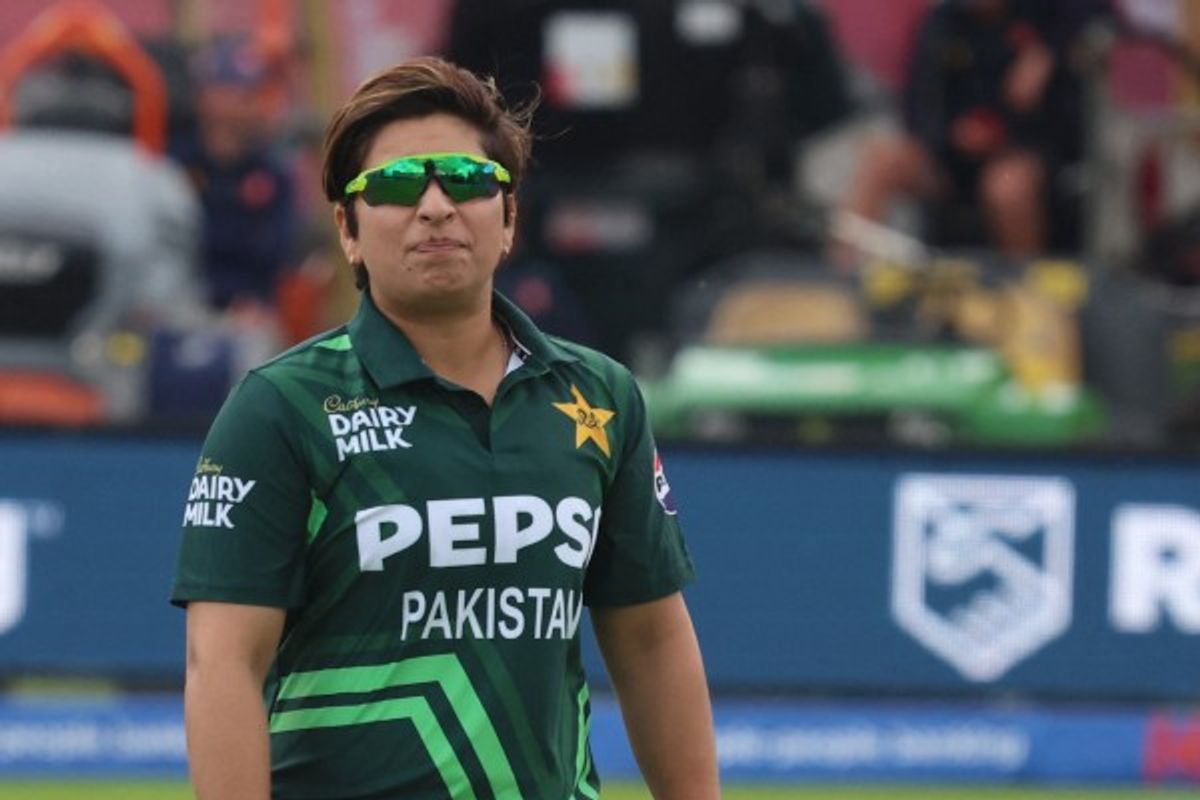Nida Dar’s brave call for mental wellness
The former Pakistan cricket captain has stepped away from the game to focus on her “well-being”

Kulsoom Jahan
Sports Correspondent
Kulsoom Jahan is a driven and accomplished professional with a passion for sports, news, storytelling, and in-depth fact-gathering. With eight years of experience in the sports media industry, she has honed her skills in conducting insightful interviews, crafting compelling narratives, and delivering high-quality content. Known for her ability to meet deadlines well in advance, Kulsoom is meticulous in her attention to both video and audio details, ensuring excellence in every project she undertakes. Her dedication and expertise make her a valuable asset in the ever-evolving world of sports media.

Pakistan's Nida Dar in action during her team's ODI match against England at The Cloud County Ground in Chelmsford, on May 29, 2024.
AFP
Former Pakistan women’s cricket captain Nida Dar has announced a temporary break from professional cricket to focus on her mental well-being.
In a heartfelt message shared on Twitter, the 38-year-old all-rounder opened up about her struggles, writing: “I would like to inform you that a lot of things have happened in the past with me personally and professionally, and this has affected my mental health. For this reason, I am taking a break from cricket to focus on my well-being. Please respect my privacy.”
A right-handed batter and right-arm off-break bowler, Dar made her ODI debut in 2010 against Ireland and has since become one of Pakistan’s most celebrated cricketers.
In 2023, she was appointed captain and led the national team to a historic T20I series win over New Zealand — Pakistan's first-ever T20I series victory outside of Asia and Ireland, and the first by any Asian team against New Zealand.
However, her tenure as captain also had its challenges.
Under her leadership, Pakistan failed to win any of their six ODI series and won just two out of seven T20I series.
In August 2024, Dar was succeeded as captain by Fatima Sana. A few months later, in November, both Dar and veteran teammate Aliya Riaz were omitted from the Pakistan Cricket Board’s (PCB) list of centrally-contracted players.
Dar was later invited to attend a training camp for the ICC Women’s Cricket World Cup Qualifiers but was unable to pass the mandatory fitness test. Although the camp was held in Faisalabad, she did not attend. She also declined participation in the National T20 Cup, formally stepping away from the game to prioritize her mental health.
Throughout her distinguished career, Nida Dar has taken 108 wickets in 112 ODIs and 160 wickets in 144 T20Is, making her the second-highest wicket-taker in the history of women’s T20 internationals.
A global conversation: Mental health in cricket
Nida Dar’s decision is part of a growing, global conversation about mental health in professional sport — particularly in cricket, a game long associated with relentless schedules, public scrutiny, and emotional pressure. She joins a list of international cricketers who have bravely opened up about their mental health journeys.
Virat Kohli (India)
One of the greatest batters of the modern era, Kohli admitted to mental exhaustion after years of continuous cricket. In 2022, he took a break, later revealing he was "faking his intensity" and emotionally drained.
After a month of rest and introspection, he returned refreshed and reinvigorated.
Praveen Kumar (India)
Former Indian fast bowler Praveen Kumar spoke candidly in 2020 about a dark phase in his life when he contemplated suicide. A photo of his smiling children stopped him, leading him to seek therapy, where he was diagnosed with depression. Today, he aspires to coach and help young cricketers.
Ben Stokes (England)
England's Test captain and premier all-rounder, Ben Stokes took an indefinite break in 2021 to address his mental health. He later shared that he had suffered panic attacks and continued medication for anxiety even after his successful return to cricket six months later.
Marcus Trescothick (England)
Trescothick returned home mid-tour from India in 2006, later revealing he was battling depression. He also withdrew early from the 2006–07 Ashes series. His struggles led to early retirement from international cricket, though he continued to play domestic cricket.
Glenn Maxwell (Australia)
Maxwell took a break in 2019, citing struggles with mental health that he had hidden for 18 months. Diagnosed with mild anxiety and depression, he has since returned to international cricket and was part of Australia’s squad for the 2023 World Cup.
Meg Lanning (Australia)
Australia’s six-time World Cup-winning captain stepped away in 2022 after the Commonwealth Games. She quietly worked in a café during her six-month break and missed major series, including the Ashes. In 2023, Lanning revealed that her early retirement at age 31 was prompted by depression and disordered eating behaviors.
"I wasn’t in a place to go on tour and give the commitment required,” she told The Howie Games podcast.
Andrew Flintoff (England)
The legendary all-rounder struggled with anxiety and depression during the 2006–07 Ashes series. Flintoff later admitted that alcohol became his coping mechanism. He was reportedly on antidepressants at the time of his retirement in 2009.
Sarah Taylor (England)
Widely regarded as one of the best wicketkeepers in women’s cricket, Taylor retired in 2019 due to severe anxiety. She has been a strong advocate for mental health awareness in sports ever since.
Jonathan Trott (England)
Trott, known for his calm demeanor and technical brilliance, abruptly left the 2013 Ashes tour due to anxiety issues.
Although he made a brief return, he eventually stepped away from all formats due to ongoing psychological stress.
David Bairstow (England)
A former England and Yorkshire wicketkeeper, David Bairstow battled severe mental health issues. His life ended tragically, and he remains a poignant reminder of the silent struggles faced by many athletes. He was the father of current England cricketer Jonny Bairstow.










Comments
See what people are discussing